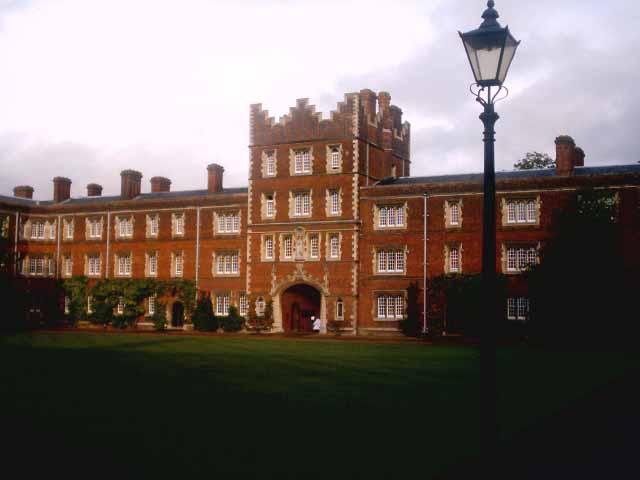John Duport was born c. 1549 (?) in Sheepshed, Leicestershire. He was the eldest son of Thomas Duport and his wife, Cornelia Norton of Kent. The Duports had been substantial landholders there since the early fifteenth century, tracing their origins to a Normandy family. John matriculated as a pensioner from Jesus College, Cambridge, in 1564, and remained there for most of his life. Having graduated BA - and MA in 1573, he gained a doctorate (DD) in 1590, was a fellow of the college for several years. He married Rachel, daughter of Richard Cox, bishop of Ely. By her he had two sons, one of whom (James Duport) was also a noted Greek scholar and divine. He was ordained clergyman during this time, and had several ‘livings‘ in different counties and parishes throughout his life. He acted as precentor of St Paul's for over thirty years, and was a prebendary of Ely for most of the final decade of his life.
Jesus College Cambridgeflickr.com
As Master of Jesus College Cambridge for almost thirty years from 1589 to his death in 1617, John Duport was a learned man of high standing, one of England‘s senior scholars. Having come from a wealthy family, and gaining frequent preferments - that is, promotions - in changing parishes, Duport became a liberal benefactor of the College. Alexander McClure has an interesting if scathing comment (from a nineteenth century perspective) about an ecclesiastical system which too easily allowed unsuitable pastoral appointments to be made for several successive centuries:
Almost every parish, whenever vacant, is in the gift of some man of wealth, or high officer in church, state, university, or other corporation: Hence frequence removals to more desirable parishes tend to shew that a clergyman has very influential friends or is in high esteem. Still this does not necessarily follow, inasmuch as a very great part of this business is mere matter of bargain and sale. The person who has the right of presenting a clergyman to be pastor of a vacant church is called the “patron;” and the right of presentation is called the “advowson.” These advowsons are bought, sold, bequeathed or inherited, like any other right or possession. They may be owned by heretics or infidels, who are under very little restraint as to their choice of ministers to fill the vacancies that occur. If the bishop should refuse to institute the person nominated, it would involve the prelate in great trouble, unless he could make out a very strong case against the fitness of the rejected presentee. Meanwhile the flocks, who pay the tithes which support the minister, have no voice in the matter, except in comparatively few parishes. They may be dearly loved for their flesh and fleece; but they must take the shepherd who is set over them. If they dislike his pasture, and jump the fence to feed elsewhere, they must pay tithes and offerings all the same to the convivial rector, fox-hunting vicar, or Puseyite priest, who has secured the “benefice” or “living.” It is astonishing, that, under such an ecclesiastical system, the Church of England is not more thoroughly corrupted. And it is astonishing, that such a system can be endured to the middle of such a century as this, by a nation whose loudest and proudest boast is of liberty.
apuritansmind.com
There were several Masters of Cambridge colleges at this time, who all shared moderate Puritan views of the Bible and church life. In 1595 he had joined with Laurence Chaderton and six other heads of colleges in a letter to the Archbishop. In it they complained that Calvinistic teaching was being undermined by unbiblical views (later dubbed “Arminian”). The letter was designed:
to testify our own opinions for the defence and preservation of that truth of doctrine in some substantial points which hath been always in our memories both here and elsewhere, taught, professed and continued and never openly impugned amongst us.(1)Duport was vice-chancellor of the College several times, and in that capacity ensured the university condemned the anti-Calvinist views of William Barrett in 1595.
The central point of controversy was the old one of election. Could any Christian feel totally confident of his salvation, in spite of frequent lapses into sin? A substantial body of senior academics at Cambridge had no doubt on the matter.(1)spurgeon.files.wordpress.com
This was because they believed salvation depended entirely on the grace of God, and was not dependent on any human merit whatsoever! Neither was forgiveness cheaply obtained, because it cost God the most painful sacrifice of His “only begotten Son,” to enable us to enjoy salvation, as St. Paul implies in Romans 8:32.
Translation work
Duport headed up the second Cambridge group translating the Apocrypha of the King James Version. No details are available as to his specific contribution to the translation process. His colleague on the committee was John Bois, who worked assiduously for four years, and so was able to finish his part early. He then turned to help one of the other translators, who had fallen behind in his work. His name remains anonymous, and we have no certain idea as to who it might have been. John Duport died six years after publication, about Christmas, 1617, and left, says McClure "a well-earned reputation as 'a reverend man in his generation.' Let him also be reverend in this generation, for his agency in the final preparation of the Bible in English."
(1) Wilson, Derek The People's Bible Lon: Lion, p. 98.(2) Payne, Gustavus, (1959/1977)The men behind the King James version, MI: Bakerpp. 62 - 63
(3) Shepard, Alexandra. (2004) Oxford Dictionary of National Biography
This is 27/52. Previous Next Index



No comments:
Post a Comment